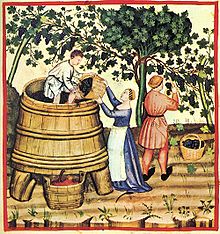
The history of the wine press and of pressing is nearly as old as the history of wine itself with the remains of wine presses providing some of the longest-serving evidence of organised viticulture and winemaking in the ancient world.[1] The earliest wine press was probably the human foot or hand, crushing and squeezing grapes into a bag or container where the contents would ferment.[2]
The pressure applied by these manual means was limited and these early wines were probably pale in colour and body, and eventually ancient winemakers sought out alternative means of pressing their wine. By at least the 18th dynasty, the ancient Egyptians were employing a "sack press" made of cloth that was squeezed with the aid of a giant tourniquet.[2] The use of a wine press in winemaking is mentioned frequently in the Bible but these presses were more elaboration of treading lagars where grapes that were tread by feet with the juice running off into special basins.
The more modern idea of a piece of a winemaking equipment used to extract the juice from the skins probably emerged during the Greco-Roman periods from which written accounts by Cato the Elder, Marcus Terentius Varro, Pliny the Elder and others described wooden wine presses that utilized large beams, capstans and windlasses to exert pressure on the pomace.[1][3] The wines produced by these presses were usually darker, with more color extracted from the skins but could also be more harsh with bitter tannins also extracted. That style of wine press would eventually evolve into the basket press used in the Middle Ages by wine estates of the nobility and Catholic Church leading to the modern tank batch and continuous presses used in wineries today.[1][4]
- ^ a b c J. Robinson (ed) "The Oxford Companion to Wine" Third Edition pp. 545–546 Oxford University Press 2006 ISBN 0198609906
- ^ a b H. Johnson Vintage: The Story of Wine pp. 14–31 Simon and Schuster 1989 ISBN 0-671-68702-6
- ^ H. Johnson Vintage: The Story of Wine pp. 70, 124–125, 147, 202–214 Simon and Schuster 1989 ISBN 0-671-68702-6
- ^ T. Pellechia Wine: The 8,000-Year-Old Story of the Wine Trade pg 28, 50-51 and 149 Running Press, London 2006 ISBN 1-56025-871-3